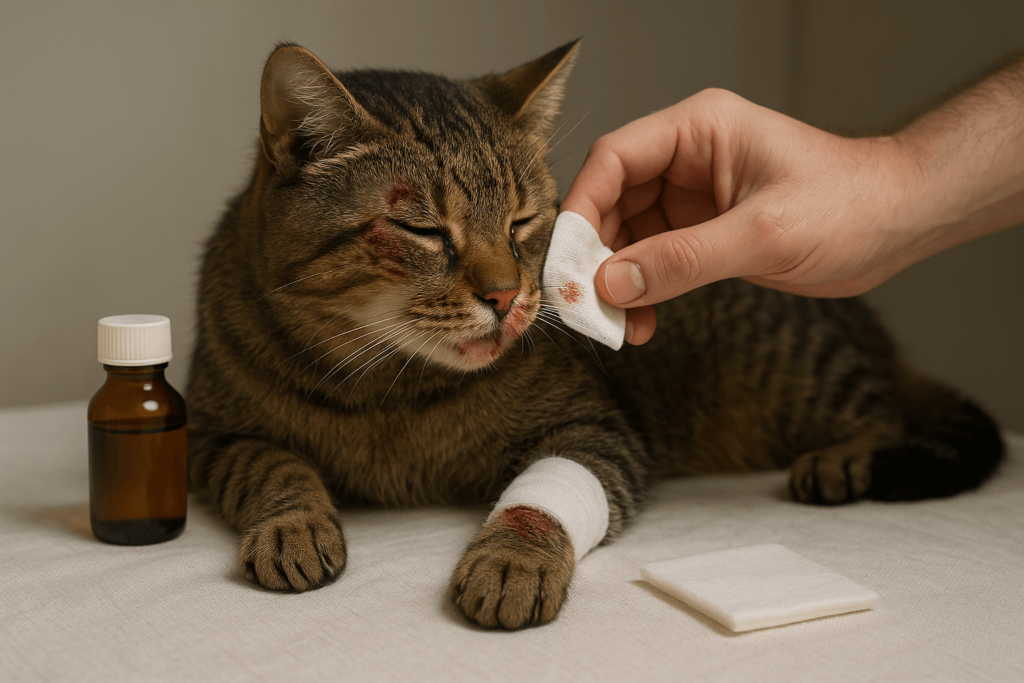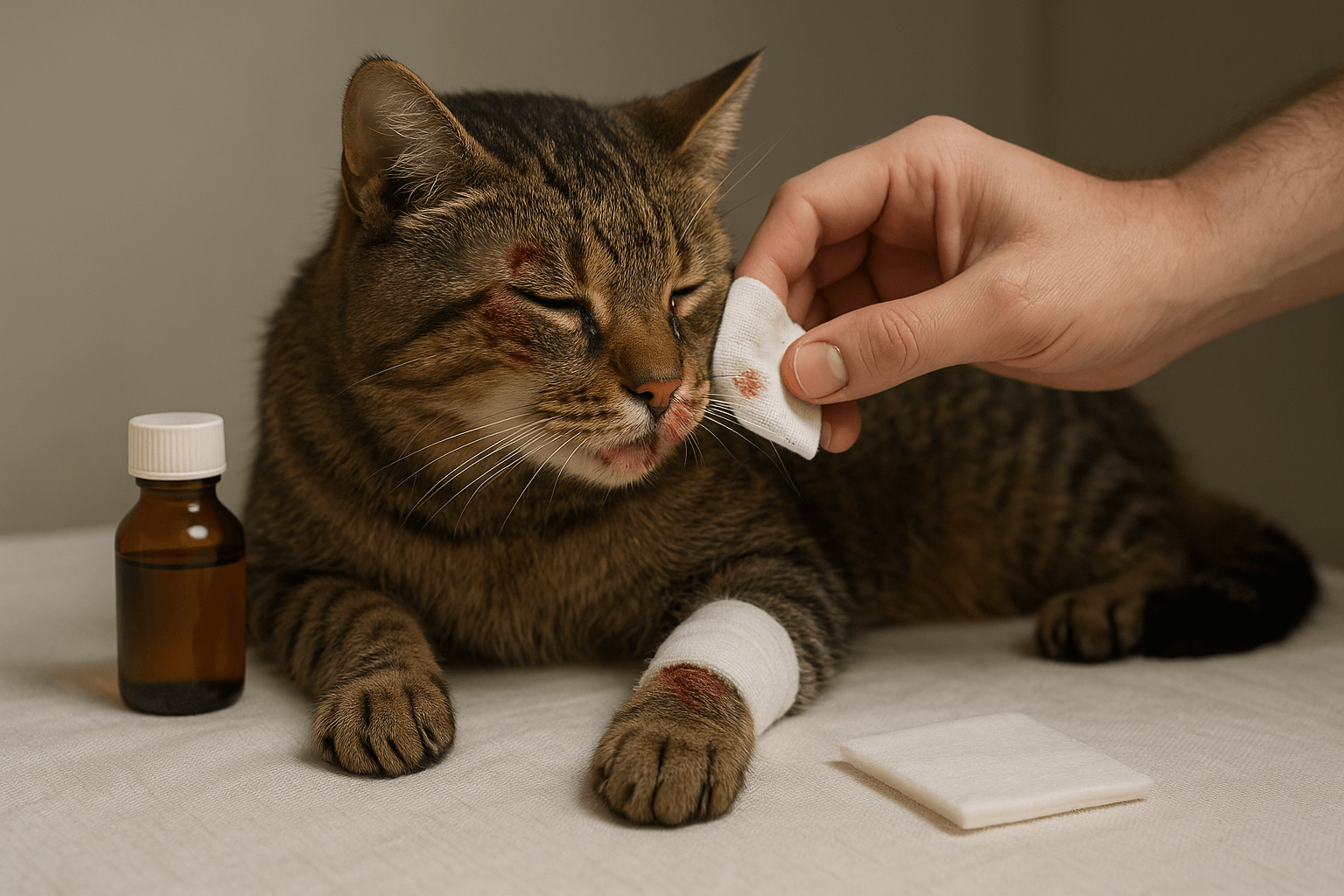Cat Fight Injury Treatment: Essential Steps to Save Your Cat’s Life
When cats fight, the damage isn’t always visible. A single bite or scratch can lead to life-threatening infections, abscesses, or systemic illness — even if your cat seems fine at first. Cat fight injury treatment isn’t optional; it’s urgent. Understanding what to do — and what not to do — can mean the difference between a quick recovery and a prolonged, costly medical crisis. This guide walks you through every critical step, from recognizing hidden injuries to preventing future conflicts, so you can protect your feline companion with confidence.
Why Cat Fight Injuries Are More Dangerous Than They Appear
Cat fights are not playful tussles — they’re high-risk encounters with serious biological consequences. Even minor wounds require immediate attention because of the unique nature of feline bites and claws.
Bacteria-Rich Saliva:
A cat’s mouth contains Pasteurella multocida and other aggressive bacteria that thrive in deep puncture wounds, leading to rapid infection.Hidden Puncture Wounds:
Cat teeth create small, clean holes that seal quickly, trapping bacteria beneath the skin where they multiply undetected.Abscess Formation:
Within 24–48 hours, infected wounds often swell into painful, pus-filled abscesses — sometimes mistaken for simple swelling or insect bites.Systemic Infection Risk:
Untreated infections can spread to the bloodstream, causing sepsis — a life-threatening condition requiring emergency care.Transmission of Viruses:
Fights can transmit FIV (feline immunodeficiency virus) and FeLV (feline leukemia virus), especially among unvaccinated or outdoor cats.
These injuries may look minor, but their internal impact is severe. Ignoring them is not an option — early intervention is the cornerstone of effective cat fight injury treatment.

Immediate First Aid for Cat Fight Injuries
If you witness or suspect a fight, acting quickly can prevent complications. First aid doesn’t replace veterinary care — but it can buy crucial time.
Keep Your Cat Calm:
Gently wrap your cat in a towel to prevent further injury and reduce stress. Avoid sudden movements or loud noises.Do Not Squeeze or Poke the Wound:
Pressing on punctures can force bacteria deeper. Let the wound breathe — don’t try to “clean” it aggressively.Check for Bleeding:
Apply light pressure with a clean cloth if bleeding is active. Most cat bite wounds stop bleeding quickly due to small entry points.Avoid Home Remedies Like Alcohol or Hydrogen Peroxide:
These can damage tissue and delay healing. Never apply ointments, powders, or human antiseptics without veterinary approval.Prepare for the Vet Visit:
Note the time of the fight, any visible wounds, changes in behavior, and whether your cat is up to date on vaccines.
Even if your cat seems fine, schedule a vet appointment within 24 hours. The most dangerous injuries are often the ones you can’t see.
Check this guide 👉Understanding Cat Fight Wounds: Best 7 Health Tips!
Check this guide 👉Why Do Dogs Break Up Cat Fights? Best 7 Expert Tips!
Check this guide 👉How to Stop a Cat Fight: Best 7 Expert Tips!
| Injury Type | Key Warning Signs |
|---|---|
| Puncture Wounds | Small holes, mild swelling, foul odor, localized heat |
| Abscesses | Large, soft swelling, pus drainage, fever, loss of appetite |
| Lacerations | Open cuts, excessive bleeding, visible tissue damage, limping |
| Internal Injuries | Difficulty breathing, pale gums, bloated abdomen, weakness, collapse |
| Systemic Infection | High fever, vomiting, lethargy, swollen lymph nodes, refusal to eat or drink |
Veterinary Treatment for Cat Fight Injuries
Professional care is non-negotiable. Veterinarians are trained to detect hidden trauma and prevent complications that home care cannot address.
Wound Cleaning and Drainage:
Abscesses are surgically lanced and flushed with sterile solution to remove pus and debris — often under sedation.Antibiotic Therapy:
Oral or injectable antibiotics (like amoxicillin-clavulanate) are prescribed for 7–14 days to combat deep bacterial infections.Pain Management:
Cats hide pain. Veterinarians administer safe, species-specific pain relief to aid recovery and encourage eating.Wound Care Instructions:
You’ll receive guidance on cleaning the area, monitoring healing, and recognizing signs of re-infection.Testing for FIV/FeLV:
If your cat is unvaccinated or has outdoor access, a blood test is recommended 6–8 weeks post-injury to rule out viral transmission.
Never attempt to drain an abscess yourself. Improper handling can cause sepsis or spread infection. Trust your vet — they’ve seen this before, and they know how to handle it.
Recovery and Home Care After a Cat Fight
Once your cat returns home, your role shifts to vigilant support. Recovery takes time — and consistency.
Follow Medication Schedules Exactly:
Complete the full course of antibiotics, even if your cat seems better. Stopping early invites resistant bacteria.Keep the Wound Clean and Dry:
Gently wipe around the area with warm water and a soft cloth — never scrub. Avoid bandages unless directed.Prevent Licking or Biting:
Use an Elizabethan collar (cone) if your cat tries to lick the wound. This prevents reopening and infection.Monitor Eating and Elimination:
A cat that stops eating or using the litter box is in distress. Contact your vet immediately if this happens.Limit Activity and Stress:
Keep your cat indoors, quiet, and away from other animals until fully healed — usually 7–14 days.
Recovery isn’t just about healing skin — it’s about restoring your cat’s sense of safety. A calm, predictable environment speeds recovery.
How to Prevent Future Cat Fights
Prevention is the best form of cat fight injury treatment. Once a cat has been injured, the risk of recurrence increases.
Spay or Neuter Your Cat:
Unaltered cats are far more territorial and aggressive. Sterilization reduces fighting by up to 80%.Keep Cats Indoors:
Outdoor access is the #1 risk factor for cat fights. Indoor cats live longer, healthier lives with zero fight-related injuries.Introduce New Cats Slowly:
Use scent swapping, visual barriers, and gradual exposure to prevent territorial aggression between household cats.Provide Environmental Enrichment:
Multiple litter boxes, vertical spaces, toys, and feeding stations reduce competition and tension in multi-cat homes.Use Pheromone Diffusers:
Products like Feliway mimic calming feline facial pheromones and reduce anxiety-driven aggression.
A peaceful home isn’t luck — it’s strategy. Preventing fights protects your cat’s body, your wallet, and your peace of mind.
When to Seek Emergency Care
Not all cat fight injuries wait for office hours. Recognize these red flags and go to an emergency clinic immediately.
- Your cat collapses or cannot stand.
- There is heavy, uncontrolled bleeding.
- The wound is gaping or exposes muscle or bone.
- Your cat is shivering, panting, or has pale gums.
- You notice swelling around the neck or chest — this can block airways.
Time is tissue. Infections from cat bites can turn fatal within 48 hours. When in doubt, err on the side of caution. Emergency vets are trained for exactly this.
Myths About Cat Fight Injuries — Debunked
Misinformation can cost your cat its life. Let’s clear up the most dangerous myths.
Myth: “If my cat is still playing, they’re fine.”
Cats hide pain. Lethargy, hiding, or loss of appetite are far more reliable indicators than active behavior.Myth: “I can clean it with hydrogen peroxide.”
Peroxide kills healthy cells and delays healing. Warm water and vet-approved cleansers are the only safe options.Myth: “My cat is vaccinated, so they won’t get sick.”
Vaccines prevent FIV/FeLV — but not bacterial infections from bites. Antibiotics are still essential.Myth: “Abscesses will pop on their own — no need to go to the vet.”
They may rupture, but without professional cleaning and antibiotics, the infection returns — often worse.Myth: “Declawing stops fighting.”
Declawing removes a cat’s ability to defend itself, making them more vulnerable — and doesn’t address the root cause of aggression.
Knowledge saves lives. Always rely on veterinary science, not internet rumors.
Frequently Asked Questions About Cat Fight Injury Treatment
Can a cat die from a cat fight injury?
Yes. Untreated infections can lead to sepsis, organ failure, or death within days. Prompt veterinary care is critical.
How long does it take for a cat abscess to heal?
With proper treatment, most abscesses heal in 7–10 days. Without treatment, they can recur or spread.
Should I isolate my cat after a fight?
Yes. Keep them away from other pets until fully healed to prevent stress, re-injury, or transmission of infection.
Is it normal for my cat to sleep all day after a fight?
Some lethargy is normal due to pain or fever. But if your cat won’t eat, drink, or respond to you for more than 24 hours, contact your vet.
Can I use human antibiotics on my cat?
Never. Many human medications are toxic to cats. Only use antibiotics prescribed by a veterinarian.
Embrace Prevention — Because Healing Shouldn’t Be the Goal
Cat fight injury treatment is not about fixing damage — it’s about preventing it from ever happening. Every abscess, every antibiotic course, every emergency visit is a reminder: our cats are not wild animals living in a human world. They depend on us to create safe, enriching environments where their instincts can be expressed without consequence. Spaying, neutering, indoor living, and environmental harmony aren’t just recommendations — they’re responsibilities. When you choose to protect your cat from fights, you’re not just saving money or furniture. You’re giving them the gift of a longer, healthier, pain-free life. Let your love be proactive. Let your care be preventive. Because the best treatment? It never had to happen at all.
Canned Pumpkin for Cat Diarrhea: Best 7 Expert Tips! Natural remedy to firm stools, soothe upset bellies, and support gut health safely.
Can a Cat Give You Scabies? Best 7 Expert Tips! Discover the truth about feline mites, human skin risks, and how to protect yourself—without panic.
Cat Flea vs Human Flea: Best 7 Expert Tips! Discover the truth about bites, species, and how to eliminate infestations for good.
Weird Cat Behaviors: Best 7 Expert Tips! Discover why cats do strange things—and how to understand, not punish, their instincts for a happier home.





